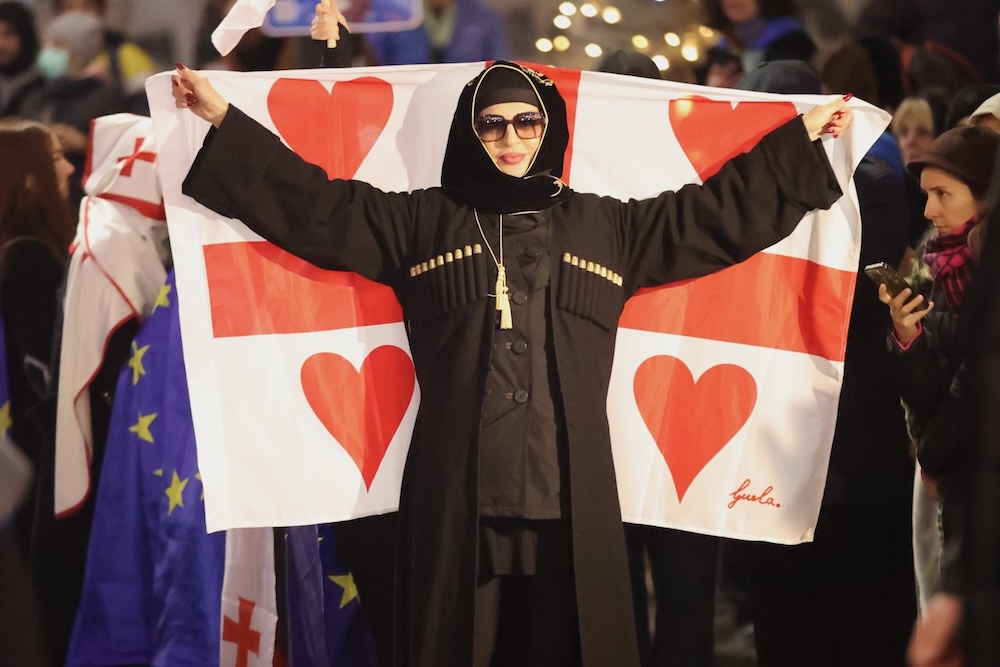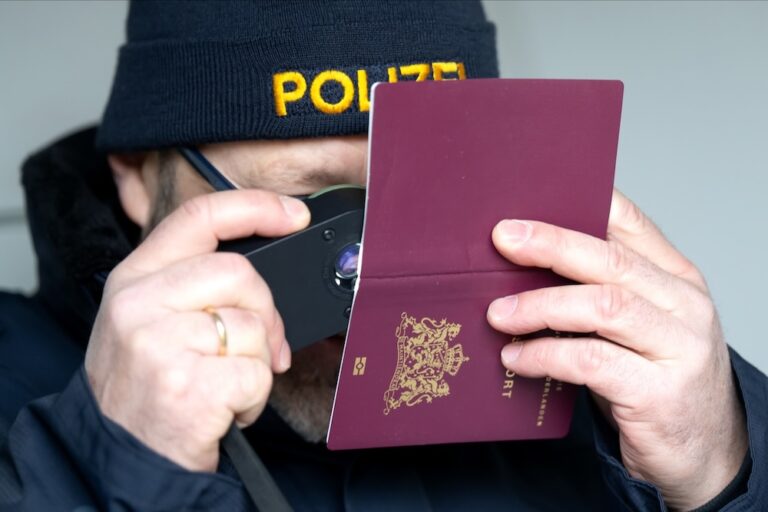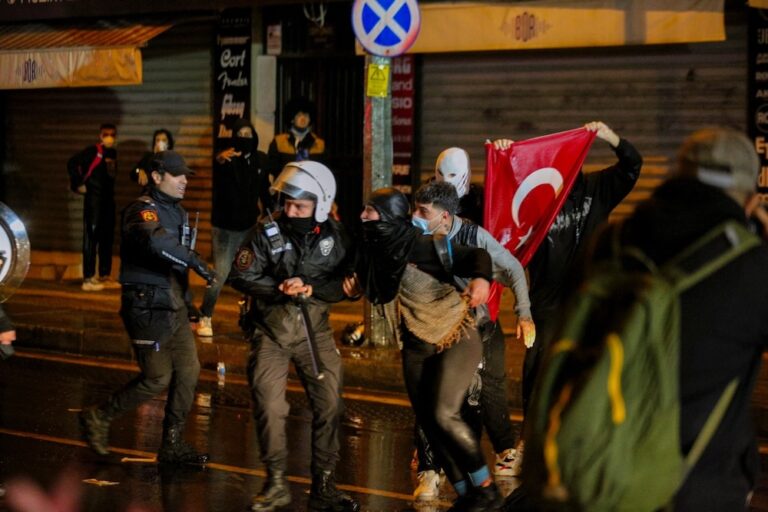December 2024 in Europe and Central Asia: A free expression round-up produced by IFEX's Regional Editor Cathal Sheerin, based on IFEX member reports and news from the region.
Belarus’s “most repressive year” for media; police target journalists, attack and torture protesters in Georgia; SLAPPs “increasingly employed as a form of private censorship” in Europe; online violence against women journalists in Ukraine; IFEX calls for withdrawal of Turkey’s “agents of influence” bill.
“The darkest and most repressive year”
Belarus’s presidential election will take place on 26 January 2025, and the result – President Lukashenka remaining in power – is really not in doubt.
The previous presidential election (August 2020) took place in a very different environment. At that time, there was a strong, vibrant opposition movement operating within the country and a functioning civil society (insofar as a civil society could function freely under the Lukashenka regime).
In the lead-up to that vote – and during the weeks that followed it – opposition candidates were arrested, imprisoned or forced into exile. Dubious ballot counting on election day saw Lukashenka claim over 80% of the vote. That result triggered an unprecedented wave of demonstrations across Belarus, and an equally unprecedented, violent response from the authorities. Thousands of Belarusian citizens were beaten and/or arrested; many were tortured.
Since then, independent media and civil society in Belarus have been decimated in what Lukashenka himself has described as a “purge”. Belarus currently has approximately 1,300 political prisoners, many of whom are in prison for taking part in the 2020 protests. All Belarus-based opposition candidates from 2020 remain behind bars. And, as exiled opposition leader Sviatlana Tsikhanouskaya notes in an article for Index on Censorship, the repression has intensified in recent months.
News from Belarus during 2024 has made for grim reading. In its overview of the year, Human Rights Centre Viasna describes 2024 as “the darkest and most repressive year” for Belarusian media. The Belarusian Association of Journalists (BAJ) concurs, estimating that there were at least 45 journalists behind bars at the end of 2024. Almost all media outlets, it reports, have been declared “extremist organisations”.
In a December interview with Belarusian Radio Racyja, BAJ’s Deputy Chairperson Barys Haretski identifies the targeting of Belarusian journalists in exile as being a particularly representative trend of 2024:
“‘In absentia proceedings’ is probably the phrase of the year for the Belarusian media community. This year, the authorities’ repressive measures against journalists who left Belarus have intensified significantly. Almost 60 searches have been recorded so far. I am afraid that by the end of the year there will be even more. And most of these searches are searches of people who left Belarus – and the security forces came to their relatives in Minsk and other cities. While conducting these in absentia proceedings, they confiscate property, and take away editorial certificates. This is one of the sad aspects of this year.”
BAJ Deputy Chairperson Barys Haretski
The final quarter of 2024 saw dozens of journalists and activists convicted in absentia. Among these were the 20 defendants (journalists, researchers, and politicians) who were tried because of their association with Sviatlana Tsikhanouskaya: all received heavy prison sentences and were added to the KGB’s “terrorist” list.
Viasna provides a comprehensive overview of how the Lukashenka government harassed Belarusians in exile during 2024. As well as facing trials in absentia and pressure on relatives at home, exiles received written and telephoned threats from the Belarusian authorities. If these exiles were also labelled “extremists” or “terrorists”, communication with them in a professional capacity was criminalised.
Of those journalists who remain in Belarus, several were detained or handed prison sentences in December. Among them were: Volha Radzivonava, who received a four year sentence for collaborating with German newspaper Die Tageszeitung; Ihar Karnei, who received an additional eight months in prison for allegedly disobeying prison authorities; Andrei Tolchyn, who was re-detained less than three months after being released on a presidential pardon; and seven employees of the recently defunct private newspaper Intex-Press, who were detained on suspicion of “promoting extremist activities”.
However, one good piece of news from Belarus in December was the release from prison of BelaPAN editor-in-chief Iryna Leushyna. She had been behind bars since August 2021 and was convicted of “creating and leading an extremist organisation”. She was released on completion of her sentence.
“Chased down, violently detained”
In Georgia, the massive anti-government protests continued throughout December, fuelled by the ruling Georgian Dream Party’s decision to freeze EU membership negotiations and also by anger at the results of the October parliamentary elections that kept Georgian Dream in power.
Georgia’s former president, Salome Zourabichvili (replaced by Georgian Dream ally Mikheil Kavelashvili on 29 December), has publicly declared that the results of the October election were rigged; OSCE election monitors have also raised “serious concerns” about the fairness of the ballot; members of the European Parliament have condemned the election result, citing “serious irregularities”, and called for sanctions to be imposed on Georgia’s prime minister and other high-ranking officials, and for the election to be re-run.
The authorities’ crackdown on the protests has been harsh, and often brutal. By early December, hundreds of protesters had been arrested, opposition parties’ offices had been raided by police, and masked men had been filmed assaulting the camera crew of a pro-opposition broadcaster. Human Rights Watch (HRW) reported that security forces “chased down, violently detained, and beat protesters [and that] … police also tortured and otherwise ill-treated them”.
Dozens of journalists covering the protests experienced physical attacks, verbal abuse, or intimidation by the police. Several IFEX members called on the EU to pressure Georgia to end this targeting of the media. HRW called on EU member states to “use the EU’s Global Human Rights Sanctions Regime to sanction officials responsible for authorising and carrying out beatings and violence against Georgia’s protesters”.
SLAPPs
Strategic Lawsuits Against Public Participations (SLAPPs) – lawsuits used by the rich and powerful to silence public watchdogs – continue to present a serious threat to freedom of expression in Europe. Despite welcome developments in 2024, which saw the EU adopting its Anti-SLAPP Directive and the Council of Europe adopting a Recommendation on combating SLAPPs, journalists, activists, and civil society organisations (CSOs) remain vulnerable to abusive litigation.
In December, the Case Coalition Against SLAPPs in Europe (CASE) released its SLAPP report for 2024. Covering the period 2010 to 2023, the report underscores the fact that “year after year, SLAPPs are increasingly being employed as a form of private censorship”. Recognising the difficulties involved in tracking so many gagging lawsuits across so many jurisdictions, the authors state that their findings only “scratch the surface of the SLAPP problem in Europe”, and that “there are likely to be hundreds more SLAPPs that go unreported”.
A snapshot of some of the report’s key findings:
- CASE recorded 1049 SLAPPs filed in the period 2010-2023 – with 166 filed in 2023 alone;
- In 2023, a notable numbers of SLAPPs were filed in Italy, Romania, Serbia and Turkey;
- During 2010-2023, 64.3% of SLAPPs were civil lawsuits while 21.7% were criminal;
- The large majority of SLAPP lawsuits were based on national defamation laws (both criminal and civil), or similar provisions on insult or honour;
- SLAPPs were identified in countries that had not registered in previous CASE reports, including Monaco, Lithuania, Azerbaijan, and Denmark;
- Journalists were most likely to be the targets of SLAPPs, followed by media outlets, editors, activists and CSOs;
- During 2010-2023, the most common SLAPP litigants were businessmen (45.2%) and politicians (35.5%);
- In 2023, the majority of SLAPPs were filed to gag those exposing corruption (36.1%) or those working for environmental justice (16.3%);
- Lawsuit costs – especially those filed by fossil fuel giants against environmental justice groups – continued to include some exorbitant demands, including one claiming the equivalent of US $8.6m;
- SLAPP targets continued to face the threat of custodial sentences in criminal defamation cases in some jurisdictions, such as Italy and Slovakia.
The authors of the report hope that it will “serve as a reminder to governments across Europe of the importance of crafting robust Anti-SLAPP laws that align with international best practice and international human rights law”.
In brief
In December, data journalism outfit Texty.org.ua published a report on its research into online violence against women journalists in Ukraine. Focusing on 15 YouTube channels (including the ten most popular Ukrainian-language news channels and also the channels of those news outlets considered most reliable), the research analysed 285,000 comments left by viewers. It found that 9% of those comments represented gender-based, online violence. The most common types of online violence the researchers found were: hate speech (which includes misogynistic insults), threats of physical violence, and general misogyny. The researchers underscore the “chilling effect” that this has on the free expression of women journalists specifically, and of women in general. Putting this research into a broader context, Texty.org.ua cites a 2024 survey that found that 81% of Ukrainian women journalists had experienced online violence and that this could often spill over into its physical version: “14% of those [women journalists] who had experienced online violence reported that threats against them had moved from the digital space to the physical dimension”.
IFEX, alongside several free expression groups, signed a joint letter urging the EU to call on Turkey to withdraw its controversial “agents of influence” bill. The bill purports to protect the Turkish state’s security and political interests by imposing a range of penalties (including jail sentences) targeting alleged manifestations of foreign influence in Turkey. The letter highlights the threat to freedom of expression, freedom of the press and access to information presented by the draft legislation: “The bill’s vague language and failure to clearly define its terms, coupled with Turkey’s lack of judicial independence, would enable courts to effectively treat government critics as spies”.



